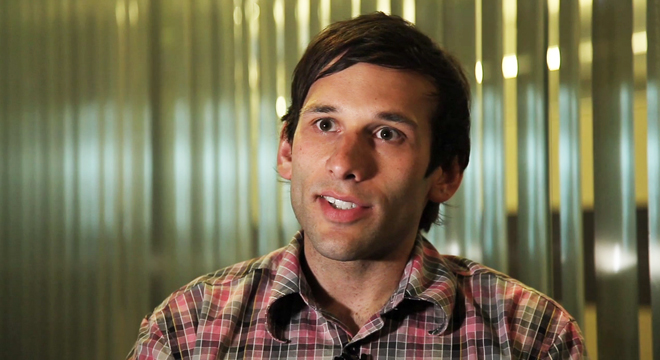The Atlantic’s Alexis Madrigal — a senior editor who covers technology — answered TPM’s questions about his own relationship with tech and what to pay attention to in the years to come.
What’s an average day as Atlantic Tech editor like?
I live out in the Bay Area, so I get up around 6 to get prepared for our morning meeting, which happens to occur at 6:30 a.m. my time. As soon as the meeting starts, I put my phone on mute and make a pot of French press coffee for my wife and me. As soon as the call ends, I start editing, which usually ends around the middle of the day, then I start in on my writing. I usually call it quits by around 4 p.m., during which time I may or may not have gone outside. I would say my overall motto is: production over pants.
The Atlantic Tech channel didn’t really exist before you joined as editor in 2010. What was the biggest challenge in getting the channel up and running?
I think the biggest challenge, as it is for everyone, is just figuring out what not to do. There are so many tech blogs and almost all of them look at the same stuff. You go on Techmeme and the big story of the day will have 100 follow-ups. Meanwhile, very significant stories down the page receive zero blog follow-ups, or maybe a couple. There’s just too much chasing in our business because so few people are actually bringing a philosophy of technology and society that extends beyond, “Yay!” or “Boo!” So, the big challenge was to figure out, “What’s an Atlantic Tech story look like? Why? How do we execute?” I knew I wanted to show people how we got the world we have today by telling them about the history of technology. Ã la David Edgerton, I also knew that I wanted to focus on the technology people were using, not just what the newest thing was. I wanted to see the tech in everything, not just in digital media. While our mission isn’t to be an investigative shop full-time, I knew that I wanted to invest big in stories that were important (like Threat Level or Danger Room at Wired).
How is Atlantic Tech different from the Wired Science blog, which you used to be in charge of?
Well, technically, I was just the lead writer over there. So, my role was different and the blog itself was different. There, we were pretty much in straight science journalism. The Atlantic stuff, both because of the field (technology) and the publication, is much voicier. We have takes and a point of view. We’re more in the discourse rather than sitting next to it.
You also recently took over as interim editor of The Atlantic Health channel. What about that position appealed to you?
It offered a bit of a return to my old science writing days, where I got to spend a lot of time digging into academic research and figuring out how and why it’s relevant to people outside the field of biomechanics or pharmacology. Also: you think people care about their phones until you start editing stories about their prostates. Whatever else is true of the way humans interact with their technologies, they still really, really, really care about their bodies.
The Atlantic Tech channel features a thoroughly diverse mix of breaking news, in-depth analysis and opinion and old but interesting tech, like patents and forgotten inventions. How do you maintain this diversity and what do you think is the overriding theme that ties everything together?
If you believe your company’s motto, you are probably an idiot or at least naive. But you know what, I really feel like we have a mission at The Atlantic that’s real. Our owner has two principles that I have taken to heart: force of intellect and spirit of generosity. There are plenty of smart people out there on the Internet, but I feel like we distinguish ourselves when we use that spirit of generosity to temper our instincts to know it all. I’m thinking about the way that Jim Fallows or Ta-Nehisi Coates work with their communities of readers and also how their minds work, the way they let characters stand in 3D and don’t flatten them into tools for their own propositions. The most amazing thing is that smart empathy is a rare and powerful thing on the Internet, so the moral posture also generates buzz and traffic. For me, that is the best thing about working at The Atlantic: I get to do what I think is right and for whatever mix of branding and history, people want that for us.
You’ve written a lot about online advertising lately, including an in-depth analysis of the numerous advertising companies tracking users around the Web every day without their expressed knowledge. What fascinates you about this industry so much and why do you think it is important for people to understand more about online advertising now?
My initial fascination was just the sheer volume and variety of companies doing data tracking. I mean, what the hell were all these places up to? I was also intrigued by how almost valueless user data is, and yet everyone collects it because they can and because they can glean some tiny amount of money from trading it.
Plus, I just don’t think people really understand the tradeoffs that they are making in exchange for the free stuff on the Internet. I think it’s probably worth it, but there are downsides. You’re giving a lot of power away and helping companies understand not just you but people like you. We should know we’re doing that.
You have also written about the essence of technology itself, and humanity’s relationship to our inventions. How would you describe your own relationship to technology?
I feel like part of being a human is to use, make, and remake technologies. It’s like dancing or telling jokes or liking salt. Finding ways to empower our fragile bodies, to give our ideas greater range and permanence: this is what technology is all about. That said, we live in a time when many technologies are developed by very powerful corporate and government entities that may limit people’s freedom to live their lives the way they want to. In the thinking of priest and philosopher Ivan Illich, “the means overtake the ends” with certain technologies. We do Facebook to do Facebook, not to connect with friends. Basically, convivial tech should help people lead healthy, good, meaningful lives without coercing them to do so.
What’s the most useful technology — gadget or service online etc. — in your own daily life?
Well, obviously all the Google tools. But the one I love is Rdio, which lets me play music from all the phases of my life. Plus, I signed my dad up, so I get to see what he’s listening to. I think that’s a powerful tool for us to connect.
What do you think the most important tech issues are going to be in the next 10 years?
How we end up bridging the knowledge we have in the physical and digital realms, respectively. We call it augmented reality now, but it is going to be simply reality in the future. We already use GPS to locate ourselves on maps or Yelp standing right in front of a restaurant. How does that evolve? The sheer weight of expectation behind things like augmented-reality glasses or contacts makes me think that things might go another way. The future is rarely that easy for so many people to get right.
What’s on your desk?
My cat.










